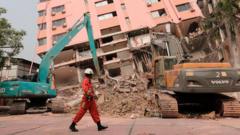In the wake of the 7.7 magnitude quake on March 28, which has resulted in 3,564 confirmed deaths and thousands more injured, the military has conducted at least 14 attacks since a ceasefire was enacted on April 2. This ceasefire was initially called by a coalition of three rebel groups working to support relief operations. However, tensions have flared as the military claims the rebel groups have launched assaults against its forces, prompting retaliation.
Maj Gen Zaw Min Tun, the military's spokesperson, stated that the army would retaliate if it faced unprovoked attacks on its bases, signaling a determination to uphold its military presence. In contrast, officials from the rebel groups maintain that their engagements were in defense against military offensives.
In light of these ongoing conflicts, UN High Commissioner for Human Rights Volker Türk has called for a complete cessation of military maneuvers, urging both parties to focus on the humanitarian crisis. Following the earthquake, assistance has been limited due to military-imposed restrictions, leaving many devastated areas lacking necessary humanitarian support.
As rescue efforts continue, relief workers are grappling with compounding challenges posed by poor weather conditions and ongoing aftershocks. UN humanitarian chief Tom Fletcher emphasized the urgent needs of affected populations for basic necessities such as food, water, and shelter. Nearly 20 million people in Myanmar were already in dire situations prior to the earthquake, exacerbating the overall humanitarian crisis in the region.
While efforts are underway to provide relief, the interplay of ongoing conflicts presents a significant barrier to addressing the needs of vulnerable communities in Myanmar.
Maj Gen Zaw Min Tun, the military's spokesperson, stated that the army would retaliate if it faced unprovoked attacks on its bases, signaling a determination to uphold its military presence. In contrast, officials from the rebel groups maintain that their engagements were in defense against military offensives.
In light of these ongoing conflicts, UN High Commissioner for Human Rights Volker Türk has called for a complete cessation of military maneuvers, urging both parties to focus on the humanitarian crisis. Following the earthquake, assistance has been limited due to military-imposed restrictions, leaving many devastated areas lacking necessary humanitarian support.
As rescue efforts continue, relief workers are grappling with compounding challenges posed by poor weather conditions and ongoing aftershocks. UN humanitarian chief Tom Fletcher emphasized the urgent needs of affected populations for basic necessities such as food, water, and shelter. Nearly 20 million people in Myanmar were already in dire situations prior to the earthquake, exacerbating the overall humanitarian crisis in the region.
While efforts are underway to provide relief, the interplay of ongoing conflicts presents a significant barrier to addressing the needs of vulnerable communities in Myanmar.
















